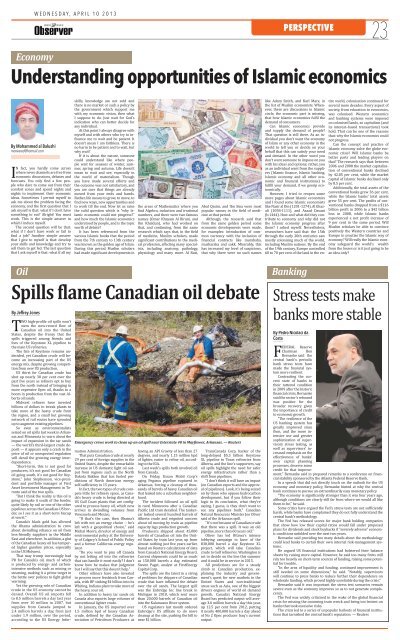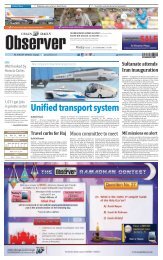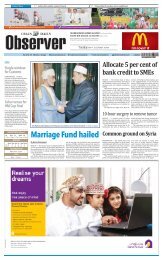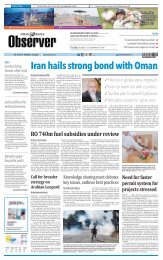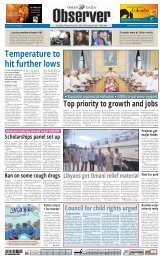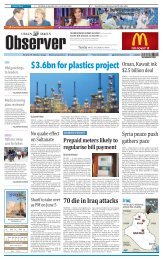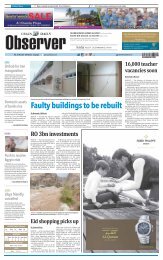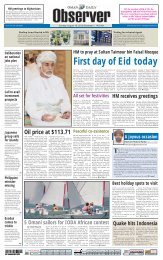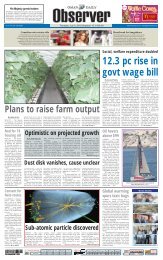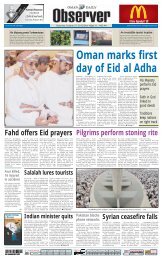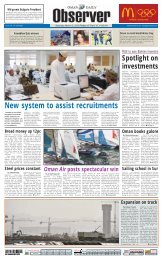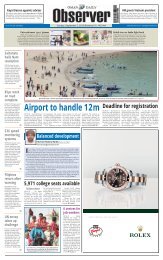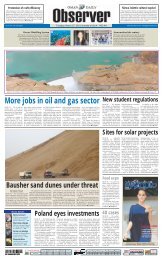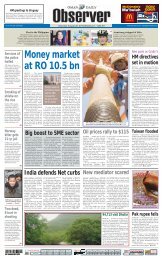Public warned of rising fraud - Oman Daily Observer
Public warned of rising fraud - Oman Daily Observer
Public warned of rising fraud - Oman Daily Observer
You also want an ePaper? Increase the reach of your titles
YUMPU automatically turns print PDFs into web optimized ePapers that Google loves.
WEDNESDAY, APRIL 10 2013<br />
PERSPECTIVE<br />
23<br />
Economy<br />
Understanding opportunities <strong>of</strong> Islamic economics<br />
By Mohammed al Balushi<br />
morwared@hotmail.com<br />
IN fact, you hardly come across<br />
where news channels are free from<br />
economic discussions, debates and<br />
forecasts. You only ind a few people<br />
who dare to come out from their<br />
comfort zones and spend nights and<br />
nights to implement their economic<br />
ideas. Sometimes I permit myself to<br />
ask me about the problem facing the<br />
economy, and the irst question that I<br />
ask myself is that: what if I don’t have<br />
something to eat? Alright! You must<br />
work. This is the simple answer in<br />
which I induce myself.<br />
The second question will be that:<br />
what if I don’t have work or fail to<br />
ind a job? Another simple answer<br />
that I give to myself is that: develop<br />
your skills and knowledge and try to<br />
sell them to get fed. The last question<br />
that I ask myself is that: what if all my<br />
skills, knowledge are not sold and<br />
there is no market or such a policy by<br />
the government which support me<br />
with my economic vision, then what<br />
I suppose to do. Just wait for God’s<br />
indication who can better decide for<br />
any individual.<br />
At this point I always disagree with<br />
myself and with others who try to in-<br />
luence me to wait and be patient. It<br />
doesn’t mean I am faithless. There is<br />
no harm to be patient and to wait, but<br />
why wait?<br />
If it is about the nature, someone<br />
could understand like where people<br />
wait for seasons <strong>of</strong> winter, summer,<br />
spring and autumn. Life doesn’t<br />
mean to wait and see, especially in<br />
the world <strong>of</strong> materialism. Though<br />
you have made several efforts and<br />
the outcome was not satisfactory, and<br />
you are sure that things are already<br />
moved from your ends and hands.<br />
Rather, life means to grow, to move, to<br />
ind new ways, new opportunities and<br />
to work till the end. Now let us raise<br />
the valid question which is “why Islamic<br />
economic could not progress?”<br />
and how much the Islamic economics<br />
understood by people, and is the topic<br />
worth <strong>of</strong> debate?<br />
It has been referenced from the<br />
various Islamic books that the period<br />
from the 7th century to 13th century<br />
was known as the golden age <strong>of</strong> Islam.<br />
During this period Muslim scholars<br />
had made signiicant developments in<br />
the areas <strong>of</strong> Mathematics where you<br />
ind Algebra, induction and irrational<br />
numbers, and there were two famous<br />
names (Omar Khayam Al Biruni, and<br />
Ibn Khaldun), who had worked on<br />
that, and continuing, from the same<br />
research which says that, in the ield<br />
<strong>of</strong> medicine, Muslim scholars, made<br />
signiicant contributions to the medical<br />
pr<strong>of</strong>ession, affecting many specialists,<br />
including anatomy, pathology,<br />
physiology and many more. Al Razi,<br />
Abul Qasim, and Ibn Sina were most<br />
popular names in the ield <strong>of</strong> medicine<br />
at that period.<br />
Although, the research said that<br />
from the same golden period some<br />
economic developments were made,<br />
for examples: introduction <strong>of</strong> common<br />
currency with the inclusion <strong>of</strong><br />
inancial contracts like murabaha,<br />
musharaka and sakk. Miserably, this<br />
has increased my level <strong>of</strong> suspicions,<br />
that why there were no such names<br />
like Adam Smith, and Karl Marx, in<br />
the list <strong>of</strong> Muslim economists. Whenever,<br />
there are discussions in Islamic<br />
circle, the economic part is missing,<br />
that how Islamic economics fulil the<br />
demand <strong>of</strong> consumers.<br />
Can Islamic economics provide<br />
and supply the demand <strong>of</strong> people?<br />
That question is still there. As an individual<br />
you don’t want the economy<br />
<strong>of</strong> Islam or any other economy in the<br />
world to tell you or decide on your<br />
behalf that this can satisfy your need<br />
and demand. In the other word you<br />
don’t want someone to impose on you<br />
with his ideas and options; rather, you<br />
as an individual want from the suppliers<br />
(Islamic inance, Islamic banking,<br />
Islamic economy and all other economic<br />
and inancial institutions) to<br />
fulill your demand, if we gossip economically.<br />
However, I tried to reopen some<br />
more pages about Islamic economics<br />
and I found some Islamic economists<br />
like Nasir al Din (1201-1274), Al Ghazali<br />
(1058-1111), and Asaad Davani<br />
(b.1444). How and what did they contribute<br />
to economy and why did not<br />
the Islamic economy progress after<br />
them? I asked myself. Nevertheless,<br />
researchers have said that: the 15th<br />
through the early 20th centuries saw<br />
mostly colonising much <strong>of</strong> the world,<br />
including Muslim nations. By the end<br />
<strong>of</strong> the 19th century, Europe controlled<br />
60 to 70 per cent <strong>of</strong> the land in the entire<br />
world, colonisation continued for<br />
several more decades. Every aspect <strong>of</strong><br />
society, from education to economics,<br />
was colonised. Western economics<br />
and banking systems were imposed<br />
on colonised lands, so capitalism (and<br />
its interest–based transactions) took<br />
hold. That can be one <strong>of</strong> the reasons<br />
that: why the Islamic economics could<br />
not progress.<br />
Can the concept and practice <strong>of</strong><br />
Islamic economy solve the globe economic<br />
crisis? Will Islamic banks be<br />
better parts and leading players on<br />
that? The research says that: between<br />
2006 and 2008 the market capitalisation<br />
<strong>of</strong> conventional banks declined<br />
by 42.85 per cent, while the market<br />
capital <strong>of</strong> Islamic banks declined only<br />
by 8.5 per cent.<br />
Additionally, the total assets <strong>of</strong> the<br />
conventional banks grew 36 per cent,<br />
while the Islamic banks’ total assets<br />
grew 55 per cent. The proits <strong>of</strong> conventional<br />
banks dropped from a $116<br />
billion proit in 2006 to a $42 billion<br />
loss in 2008, while Islamic banks<br />
experienced a net proit increase <strong>of</strong><br />
9 per cent in the same period. Will<br />
Muslim scholars be able to convince<br />
positively the Western countries and<br />
Europe to practise the Islamic way <strong>of</strong><br />
economy? Will really the Islamic economy<br />
safeguard the world’s wealth<br />
from the losses or is it just going to be<br />
an idea only?<br />
Oil<br />
Banking<br />
Spills lame Canadian oil debate<br />
By Jeffrey Jones<br />
Emergency crews work to clean up an oil spill near Interstate 40 in Maylower, Arkansas. — Reuters<br />
TWO high-proile oil spills won't<br />
stem the now-record low <strong>of</strong><br />
Canadian oil into the United<br />
States, despite the frenzy that the<br />
spills triggered among friends and<br />
foes <strong>of</strong> the Keystone XL pipeline to<br />
the main US reineries.<br />
The fate <strong>of</strong> Keystone remains undecided,<br />
yet Canadian crude will become<br />
an increasing part <strong>of</strong> the US<br />
energy mix, despite growing competition<br />
from new US production.<br />
US thirst for Canadian crude has<br />
shot up nearly 30 per cent over the<br />
past ive years as reiners opt to buy<br />
from the north instead <strong>of</strong> bringing in<br />
more expensive Opec oil, thanks to a<br />
boom in production from the vast Alberta<br />
oil sands.<br />
Midwest reiners have invested<br />
billions <strong>of</strong> dollars to tweak plants to<br />
take more <strong>of</strong> the heavy crude from<br />
the region, and a small but growing<br />
network <strong>of</strong> rail routes have sprouted<br />
up to augment existing pipelines.<br />
So even as environmentalists<br />
seized on oil spills last week in Arkansas<br />
and Minnesota to warn about the<br />
impact <strong>of</strong> expansion in the tar sands<br />
— the world's third-largest crude deposit<br />
— it appears only a crash in the<br />
price <strong>of</strong> oil or unexpected regulation<br />
will derail the growing energy interdependence.<br />
"Short-term, this is not good for<br />
producers, it's not good for Canadian<br />
oil going south, it's not good for Keystone,"<br />
John Stephenson, vice-president<br />
and portfolio manager at First<br />
Asset Investment Management in Toronto<br />
said <strong>of</strong> the two spills.<br />
"But I think the reality is this oil is<br />
going to make it south <strong>of</strong> the border,<br />
quite likely by rail or one <strong>of</strong> the other<br />
pipelines across the Canadian-US border,<br />
so I see it as a short-term hiccup<br />
at worst."<br />
Canada's black gold has allowed<br />
the Obama administration to crow<br />
about dwindling reliance on oil from<br />
less-friendly suppliers in the Middle<br />
East and elsewhere. In addition, a glut<br />
<strong>of</strong> the Canadian heavy oil has tempered<br />
higher gasoline prices, especially<br />
in the US Midwest.<br />
That may trump increasingly bad<br />
PR for Canada's oil, much <strong>of</strong> which<br />
is produced by energy- and carbonintensive<br />
methods such as mining or<br />
steaming, making it a prime target in<br />
the battle over policies to ight global<br />
warming.<br />
Yet the growing role <strong>of</strong> Canadian<br />
crude in the US economy cannot be<br />
denied. Overall US oil imports fell<br />
to 8.5 million barrels a day last year<br />
from over 10 million in 2007, but<br />
supplies from Canada jumped to<br />
2.4 million barrels a day, from just<br />
under 1.9 million, over the period,<br />
according to the US Energy Information<br />
Administration.<br />
That puts Canadian crude at nearly<br />
29 per cent <strong>of</strong> foreign supplies in the<br />
United States, despite the remarkable<br />
increase in US domestic light oil output<br />
from regions such as the North<br />
Dakota Bakken that has fueled predictions<br />
<strong>of</strong> North American energy<br />
self-suficiency in 15 years.<br />
In fact, the two types <strong>of</strong> crude compete<br />
little for reinery space, as Canada's<br />
heavy crude is being directed at<br />
US Gulf Coast plants that are conigured<br />
to process heavy oil, which now<br />
arrives in dwindling volumes from<br />
Venezuela and Mexico.<br />
"If that's the case, then Obama's<br />
left with not an energy choice -- he's<br />
left with a geopolitical choice," said<br />
Michal Moore, director <strong>of</strong> energy and<br />
environmental policy at the University<br />
<strong>of</strong> Calgary's School <strong>of</strong> <strong>Public</strong> Policy<br />
and a former California energy regulator.<br />
"Do you want to piss <strong>of</strong>f Canada<br />
by not letting oil into the reineries<br />
that can handle it most easily? I don't<br />
know how he makes that judgment<br />
but I will say that this doesn't help."<br />
Other reiners have also invested<br />
to process more feedstock from Canada,<br />
with BP sinking $4 billion into its<br />
Whiting, Indiana plant to take more <strong>of</strong><br />
the heavy, sour oil.<br />
In addition to heavy tar sands oil,<br />
Canada also exports large volumes <strong>of</strong><br />
conventional lighter crude.<br />
In January, the US imported over<br />
1.5 million bpd <strong>of</strong> heavy Canadian<br />
crude, deined by the Canadian Association<br />
<strong>of</strong> Petroleum Producers as<br />
having an API Gravity <strong>of</strong> less than 27<br />
degrees, and nearly 1.15 million bpd<br />
<strong>of</strong> lighter, easier to reine oil, according<br />
to the EIA.<br />
Last week's spills both involved oil<br />
from Canada.<br />
On Friday, Exxon Mobil Corp's<br />
aging Pegasus pipeline ruptured in<br />
Arkansas, forcing a cleanup <strong>of</strong> thousands<br />
<strong>of</strong> barrels <strong>of</strong> heavy Canadian oil<br />
that leaked into a suburban neighborhood.<br />
The incident followed an oil spill<br />
in rural Minnesota after a Canadian<br />
Paciic Ltd train derailed. The tankercar<br />
leaked several hundred barrels <strong>of</strong><br />
Alberta crude and reignited concern<br />
about oil moving by train as pipeline<br />
capacity lags production growth.<br />
Producers shipped about 45,000<br />
barrels <strong>of</strong> Canadian oil into the United<br />
States by train last year, up from<br />
almost nothing just ive years earlier,<br />
based on Reuters calculations <strong>of</strong> data<br />
from Canada's National Energy Board.<br />
Current shipments could be as much<br />
as 150,000 barrels a day, estimated<br />
Steven Paget, analyst at FirstEnergy<br />
Capital Corp.<br />
The spills are the latest in a string<br />
<strong>of</strong> problems for shippers <strong>of</strong> Canadian<br />
crude that have inlamed the debate<br />
over the oil sands. The largest spill<br />
was the Enbridge Inc line break in<br />
Michigan in 2010, which sent more<br />
than 20,000 barrels <strong>of</strong> Canadian oil<br />
into the Kalamazoo River system.<br />
US regulators last month ordered<br />
Enbridge's US afiliate to do more<br />
cleanup at the site, pushing the bill to<br />
near $1 billion.<br />
TransCanada Corp, backer <strong>of</strong> the<br />
long-delayed $5.3 billion Keystone<br />
XL pipeline to Texas reineries from<br />
Alberta, and the line's supporters, say<br />
oil spills highlight the need for safer<br />
energy infrastructure rather than a<br />
shift from pipelines.<br />
"I don't think it will have an impact<br />
(on Canadian exports and the approval<br />
<strong>of</strong> pipelines). Look, it's being seized<br />
on by those who oppose hydrocarbon<br />
development, but if you follow their<br />
logic to its conclusion, what they're<br />
saying, I guess, is they don't want to<br />
see any pipelines built," Canadian<br />
Natural Resources Minister Joe Oliver<br />
said <strong>of</strong> the Arkansas spill.<br />
"It's not because <strong>of</strong> Canadian crude<br />
that there was a spill. It was an old<br />
pipeline, more than 60 years old."<br />
Oliver has led Ottawa's intense<br />
lobbying campaign in favor <strong>of</strong> the<br />
830,000 barrel a day Keystone XL<br />
project, which will take Canadian<br />
crude to Gulf reineries. Washington is<br />
set to decide on the line this summer<br />
and it could be in service in 2015.<br />
All predictions are for a steady<br />
climb in Canadian production, explaining<br />
the industry and government's<br />
quest for new markets in the<br />
United States and non-traditional<br />
areas such as Asia, one <strong>of</strong> the biggest<br />
drivers engines <strong>of</strong> world oil demand<br />
growth. Canada's National Energy<br />
Board has predicted output will average<br />
3.6 million barrels a day this year,<br />
up 12.5 per cent from 2012, putting<br />
it nearly 400,000 barrels a day ahead<br />
<strong>of</strong> No 2 Opec producer Iraq's current<br />
output.<br />
Stress tests make<br />
banks more stable<br />
By Pedro Nicolaci da<br />
Costa<br />
FEDERAL Reserve<br />
Chairman Ben<br />
Bernanke said the<br />
central bank's periodic<br />
bank stress tests have<br />
made the inancial system<br />
more resilient.<br />
Contrasting the current<br />
state <strong>of</strong> banks to<br />
their tattered condition<br />
in 2009 after the historic<br />
inancial crisis, Bernanke<br />
said the sector's rebound<br />
was positive for the<br />
broader recovery given<br />
the importance <strong>of</strong> credit<br />
to economic growth.<br />
"The resilience <strong>of</strong> the<br />
US banking system has<br />
greatly improved since<br />
then, and the more intensive<br />
use and greater<br />
sophistication <strong>of</strong> supervisory<br />
stress testing, as<br />
well as supervisors' increased<br />
emphasis on the<br />
effectiveness <strong>of</strong> banks'<br />
own capital planning<br />
processes, deserve some<br />
credit for that improvement,"<br />
Bernanke said in prepared remarks to a conference on inancial<br />
stability sponsored by the Atlanta Federal Reserve Bank.<br />
In a speech that did not directly touch on the outlook for the US<br />
economy and monetary policy, Bernanke hinted at why the central<br />
bank continues to pursue an extraordinarily easy monetary policy.<br />
"The economy is signiicantly stronger than it was four years ago,<br />
although conditions are clearly still far from where we would all like<br />
them to be," he said.<br />
Some critics have argued the Fed's stress tests are not suficiently<br />
harsh, while banks have complained they do not fully understand the<br />
central bank's methodology.<br />
The Fed has released scores for major bank holding companies<br />
that show how low their capital ratios would fall under proposed<br />
plans for dividends and stock buybacks if "severely adverse" economic<br />
conditions unfolded over the next two years.<br />
Bernanke said providing too many details about the methodology<br />
could lead banks to curtail their own internal risk-management systems.<br />
He argued US inancial institutions had bolstered their balance<br />
sheets by raising more capital. However, he said too many irms still<br />
rely too heavily on short-term sources <strong>of</strong> funding, raising some potential<br />
for trouble.<br />
"In the area <strong>of</strong> liquidity and funding, continued improvement is<br />
still needed on some dimensions," he said. "Notably, supervisors<br />
will continue to press banks to reduce further their dependence on<br />
wholesale funding, which proved highly unreliable during the crisis."<br />
Bernanke said it was important the stress test scenarios remain<br />
severe even as the economy improves so as to not generate complacency.<br />
The Fed was widely criticised in the wake <strong>of</strong> the global inancial<br />
crisis for missing the oncoming train wreck and being too lenient on<br />
banks that took excessive risks.<br />
The crisis led to a series <strong>of</strong> unpopular bailouts <strong>of</strong> inancial institutions<br />
that tarnished the central bank's reputation. — Reuters


